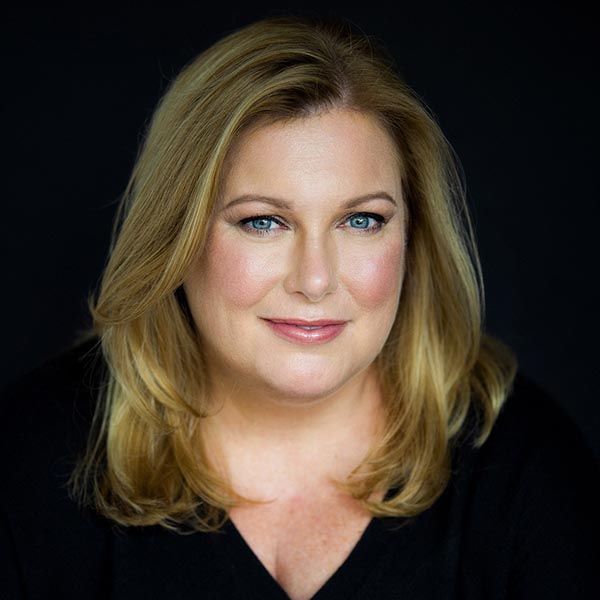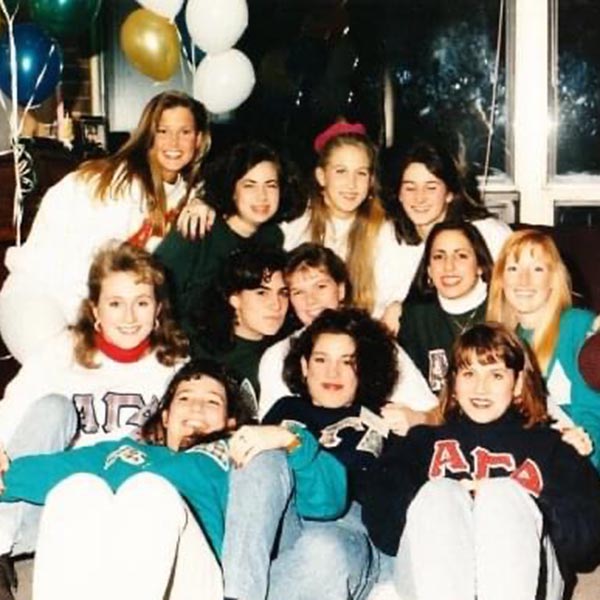As a teenager, Elizabeth “Liz” Edmiston ’93 loved to go to the mall. Her father even scolded her once by saying, “Find something else to do; you can’t make a living buying clothes.”
But that’s exactly what she has done for decades at some of the most recognized global brands, including Ralph Lauren, Tory Burch, Victoria’s Secret, Gap, and Calvin Klein. This international business and economics major is now CEO of Lane Bryant, a pioneer in women’s clothing that’s approaching its 120th anniversary.
As Paris, New York, and London wrap their spring fashion weeks, Edmiston discusses the evolving fashion industry, career highlights, and the relevancy of brick-and-mortar enterprises.
 Were you at Fashion Week?
Were you at Fashion Week?
I was in New York City for a board meeting, but not Fashion Week. Fashion shows are just one facet of the business, largely focused on global brands that need to service wholesale accounts. Our business is specialty retail as we own the end-to-end expression to the customer. We are very much in tune with Fashion Week but do not currently host a show.
What is the power of Fashion Week?
To me, the power of Fashion Week is its ability to spark conversations and ideas that shape and shift not just what we wear, but how we connect with each other and brands. As consumers, we are more aware and more interested in Fashion Week thanks to social media. As the trends trickle down, we engage in conversations about designers and brands and showcase our own interpretations on multiple platforms. We create connections that make fashion more accessible and inclusive. For brands, Fashion Week has the power to shift the trajectory of your business. It can introduce you to new audiences and gain attention to increase awareness, interest, and revenue.
Did COVID-19 hurt fashion?
Of course not, but it did change how we think about fashion. COVID shut down the traditional approaches to dressing as we worked from home in more comfortable ways. We became more thoughtful about what we bought and how and where it was made. We had time to consider our consumption before making a purchase and made our choices selectively. Brands had to pivot fast with this radical and immediate change, which was not easy with long lead times and supply chain disruption.
COVID also altered what we are wanting to wear now that we have reemerged from our homes. People seem less interested in fast fashion, reconsidering items that may not last. Instead, they are seeking clothes that have quality and longevity.
How important is the consumer mindset?
The consumer mindset is incredibly important. Right now, people aren’t sure about purchasing as they face inflation, a war in Ukraine, and a possible global recession. It creates economic pressure and impacts their psyche. It makes what we do as retailers both harder and more exciting. During COVID, people neglected aspects of their wardrobe. Now they are catching up as they return to normal life — work, going out, celebrations, and vacations.
We need to react to their changing wardrobe needs. Our industry needs to be fluid and agile throughout our product development process and supply chain to react to these changing consumer needs. And we just hope that we are more right than wrong with what we anticipate they will like!
Many other companies are adding sizes and entering our marketspace, but we are the “OG” in this industry.
Tell us about Lane Bryant.
We are more than a century old. In 1904, before women had the right to vote, Lena Bryant launched her business. She was a widow and a mother with two young children who realized a need for maternity clothes that wasn’t being met. She saw this white space opportunity and built a business, a true entrepreneur!
Now, many years later, the brand and business still remain strong but are at a pivot point as we work to evolve with fashion and consumer trends. We believe that confidence has no size and recognize that bodies change through a woman’s various life stages. Lane Bryant is a beacon for body positivity and inclusivity, and we are working to reestablish our voice.
Additionally, we have our focus back on becoming a fashion lifestyle brand, reimagining our apparel business while maintaining our leadership in intimates. Many other companies are adding sizes and entering our marketspace, but we are the “OG” in this industry. But it’s time to up our game, and that is what the team and I are focused on. I work with a talented, fun, and dynamic team who bring real adrenaline to what we are doing. It’s an exciting time to be part of Lane Bryant.
With your storied career, what are some highlights?
 It all begins with Lehigh. I took advantage of studying abroad (in Guatemala and Ghana), and it altered my view on the world. While I studied international business and economics, I always had a passion for shopping and fashion! When I was a senior and in need of a job, an alumnus visited my entrepreneurial business class to teach us about buying and running a retail business. He was the lamp buyer at Bloomingdales and very generously connected me to its HR department. I was accepted into the executive training program, which launched my career in fashion! This role laid the foundation for me and gave me my first big role as a buyer of casual sportswear.
It all begins with Lehigh. I took advantage of studying abroad (in Guatemala and Ghana), and it altered my view on the world. While I studied international business and economics, I always had a passion for shopping and fashion! When I was a senior and in need of a job, an alumnus visited my entrepreneurial business class to teach us about buying and running a retail business. He was the lamp buyer at Bloomingdales and very generously connected me to its HR department. I was accepted into the executive training program, which launched my career in fashion! This role laid the foundation for me and gave me my first big role as a buyer of casual sportswear.
I later worked at Old Navy with Mickey Drexler, who is considered the “merchant prince” of our industry. He taught me everything about what a vertical retail merchant does and how to build a business starting with product. I draw on that experience daily.
Next I worked at Ralph Lauren, who is truly a master marketer. He is a brilliant storyteller and brand builder — with such a clear and consistent point of view that has endured for over 50 years. So many lessons learned on how to nurture a brand and stay relevant without compromising your vision.
I also worked with Les Wexner while I was at Victoria’s Secret, who I consider somewhat of an “inventor” in our industry. He turned so many brands into specialty retail powerhouses, including The Limited, Express, Abercrombie & Fitch, Victoria’s Secret, Bath and Body Works to name a few. He really understands mass specialty retail and how to appeal to the expansive U.S. market.
I was fortunate to build upon this foundation and experiences and apply all of this knowledge at niche companies like Tory Burch and White House Black Market where I held executive-level merchant roles at pivotal moments in the brands’ growth.
My wanderlust caught up with me, and for seven years my family and I lived in Hong Kong where I worked as the chief brand officer for Calvin Klein to help reinvent and make it relevant for the Asian market. Truly a highlight for me both personally and professionally — I highly recommend living abroad at some point in your life.
Prior to joining Lane Bryant, I spent two years living in Montreal, Quebec, running a private company called Groupe Dynamite as president and CEO. I started my new job with great enthusiasm in February 2020 and in just six weeks was navigating the company through COVID. A very difficult experience to live through, but we didn’t let a good crisis go to waste and re-positioned the brands (Garage and Dynamite) and the organization for growth coming out of the pandemic. Not the work I had planned on, but I learned how to lead an organization through tough times.
Fashion and retail, like life, are unpredictable, sometimes volatile, but always exciting if you open yourself up to new influences.